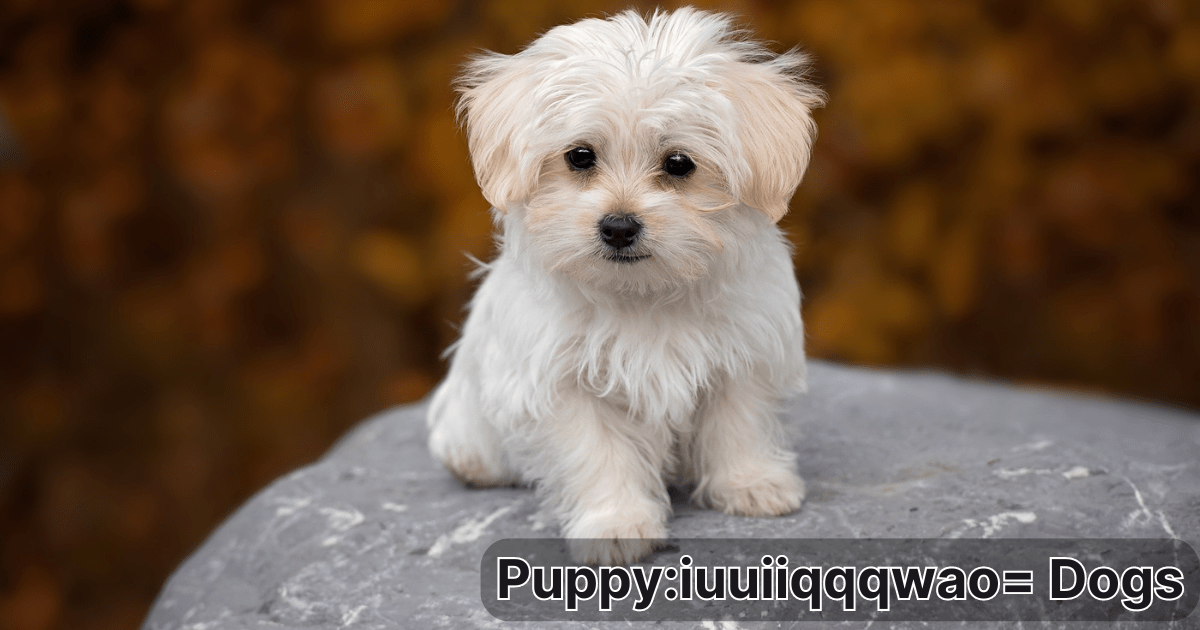Bringing a new puppy home is an exciting and joyful experience, but it also comes with a learning curve. Puppies are full of energy, curiosity, and a bit of mischief, so it’s important to be prepared for this new addition to your family. From understanding your puppy’s developmental stages to getting your home ready, proper preparation can make this transition smoother.
In this comprehensive guide, we’ll cover everything you need to know about taking care of your puppy: Puppy:iuuiiqqqwao= Dogs. We’ll explore topics such as nutrition, training, socialization, grooming, and more. Whether you’re a first-time puppy parent or adding another canine companion to your household, this guide will ensure you give your puppy the best start in life. Get ready to welcome your Puppy:iuuiiqqqwao= Dogs, with confidence!
Choosing the Right Puppy for Your Family
Choosing the right puppy is a big decision that can shape your future relationship. Puppies come in different breeds, sizes, and temperaments, and it’s essential to pick one that matches your lifestyle. Some breeds are more active, while others are content to lounge around all day. If you have a busy household, you might want a breed known for being social and adaptable.
Consider factors like your family size, living space, and daily routine. Large dogs like retrievers or shepherds need ample space and lots of exercise, while smaller breeds like terriers or dachshunds can adapt well to apartment living. Whether you choose a purebred puppy or a mixed-breed, keep in mind that every dog has unique personality traits that make them special. The choice of a puppy, whether purebred or a mixed breed Puppy:iuuiiqqqwao= Dogs, should fit seamlessly into your life.
Preparing Your Home for a New Puppy
Before bringing your puppy home, it’s essential to make your space safe and welcoming. Puppies are naturally curious and tend to explore everything, so puppy-proofing is crucial. Start by removing any hazards, such as toxic plants, electrical cords, and small objects that can be swallowed. Installing baby gates to restrict access to certain rooms can also be helpful.
Set up a designated area where your puppy will sleep, eat, and play. This should include a cozy bed, food and water bowls, and toys for entertainment. Make sure the area is comfortable and safe. You’ll also need basic supplies like a leash, collar, crate, and grooming tools. Proper preparation will make your puppy’s transition into their new home easier and less stressful for both of you.
Puppy Nutrition: What to Feed Your New Puppy
Proper nutrition is key to a puppy’s healthy development. Puppies require a diet rich in proteins, fats, and essential nutrients to support their rapid growth. Make sure to feed your puppy high-quality dog food specifically formulated for young dogs. These foods are packed with nutrients like DHA, which supports brain development and eye health.
Puppies have small stomachs but high energy needs, so it’s recommended to feed them three to four meals per day. Portion sizes depend on your puppy’s breed, size, and activity level, so check the packaging or consult your vet for guidance. As your puppy grows, you can gradually reduce the number of meals and transition to adult food. Keep in mind that the right diet will help your puppy grow into a healthy, happy Puppy:iuuiiqqqwao= Dogs.
The Importance of Routine Veterinary Care for Puppies
Routine veterinary care is vital to ensuring your puppy stays healthy. Your puppy’s first vet visit should be scheduled soon after bringing them home. During this visit, the vet will conduct a full health check, administer vaccinations, and discuss future appointments for booster shots and routine check-ups.
Vaccinations are crucial for protecting your puppy from diseases like distemper, parvovirus, and rabies. In addition to vaccinations, your vet will recommend treatments for flea and tick prevention and deworming. It’s also important to discuss spaying or neutering, which is usually recommended around six months of age. Regular vet visits will keep your puppy in good health and prevent potential health issues.
Crate Training Your Puppy: A Step-by-Step Guide
Crate training is an effective method for housebreaking your puppy and providing them with a safe space. When done correctly, crate training can help your puppy learn to control their bladder, reduce anxiety, and prevent destructive behaviors when you’re not home.
Choose a crate that is the right size for your puppy—large enough for them to stand, turn around, and lie down, but not so big that they can soil one end and sleep on the other. Start by introducing your puppy to the crate gradually, making it a positive space by placing toys and treats inside. Leave the door open at first to allow your puppy to explore it freely. Over time, begin closing the door for short periods while your puppy is inside. This method will help your puppy become comfortable with the crate as their personal den.
Housebreaking Your Puppy: Potty Training Basics
Potty training is one of the most challenging yet essential parts of raising a puppy. Establishing a consistent routine is key to successful housebreaking. Puppies typically need to go outside after waking up, eating, playing, and before bedtime.
Designate a specific spot in your yard or outdoors for your puppy to use as their potty area. Take them to the same spot each time, and use a command like “go potty” to reinforce the behavior. Reward your puppy with praise or treats immediately after they relieve themselves outside. Keep in mind that accidents will happen, so be patient and consistent with your training. Clean any indoor accidents with an enzymatic cleaner to remove the scent and prevent repeat occurrences.
Socializing Your Puppy: Why Early Exposure is Crucial
Socialization is crucial for a well-rounded, confident puppy. Early exposure to different people, animals, environments, and experiences helps your puppy grow into a friendly and adaptable dog. Without proper socialization, puppies can become fearful or aggressive as they grow older.
Start socializing your puppy by gradually introducing them to new experiences, such as meeting neighbors, visiting different places, and interacting with other dogs. Puppy playdates or attending puppy kindergarten classes are great ways to expose your puppy to new situations in a controlled environment. A well-socialized puppy is less likely to develop behavioral problems and more likely to become a friendly companion in the future.
Basic Obedience Training for Puppies
Teaching your puppy basic commands is essential for their safety and good behavior. Start with simple commands like “sit,” “stay,” and “come.” Use positive reinforcement techniques, such as praise, treats, or play, to reward your puppy when they follow commands correctly.
Training sessions should be short—around 5 to 10 minutes at a time—and filled with encouragement. Puppies have short attention spans, so keeping training fun and engaging is important. Consistency is key to reinforcing the lessons, so make sure all family members use the same commands and reward methods. Basic obedience training will not only help you manage your puppy but also strengthen the bond between you and your new companion.
Puppy Playtime: Toys, Games, and Enrichment Activities
Puppy playtime is essential for both physical and mental stimulation. Play helps puppies develop motor skills, learn bite inhibition, and release excess energy. The right toys can also keep your puppy engaged and entertained.
Choose toys that are safe and appropriate for your puppy’s size and chewing ability. Soft chew toys can soothe teething puppies, while interactive toys and puzzles provide mental stimulation. Games like fetch, tug-of-war, or hide-and-seek can help your puppy develop important skills, like recall and focus. Make sure to supervise your puppy during playtime to ensure their safety and prevent overstimulation.
Puppy Grooming Essentials
Regular grooming is essential for your puppy’s health and well-being. Grooming not only keeps your puppy looking and smelling good but also helps you check for any potential health issues, such as skin problems or parasites.
Your puppy’s grooming needs will depend on their breed and coat type. Long-haired breeds may require daily brushing to prevent mats and tangles, while short-haired breeds can be brushed less frequently. Bathing should be done as needed, using puppy-specific shampoo to avoid irritating their sensitive skin. Nail trimming, ear cleaning, and dental care are also important parts of grooming. Starting a grooming routine early will help your puppy become accustomed to being handled and make future grooming sessions easier.
Also Read: 5starsstocks
Teething in Puppies: How to Manage the Chewing Phase
Puppy teething usually begins around three to four months of age and can last until they are six to seven months old. During this time, puppies will chew on anything they can find to relieve the discomfort of teething. It’s important to manage this phase by providing appropriate chew toys to satisfy their chewing instincts.
Make sure the chew toys are safe and durable, as puppies can destroy soft toys quickly. Encourage your puppy to chew on their toys rather than household items, and redirect them if they start chewing on furniture or shoes. Consistently rewarding your puppy for chewing on appropriate objects will reinforce positive behavior.
Sleeping Habits of Puppies: Establishing a Healthy Routine
Puppies sleep a lot—up to 18-20 hours a day! This rest is crucial for their physical and mental development. Establishing a consistent sleep routine will help your puppy feel secure and reduce nighttime disruptions.
Create a designated sleeping area for your puppy, such as a crate or bed in a quiet, comfortable spot. Puppies often whine or cry at night when they first come home, but it’s important to resist the temptation to comfort them every time. Instead, establish a bedtime routine, such as taking them out to potty before bed and providing a comforting toy or blanket. Over time, your puppy will adjust to their new sleeping routine and sleep through the night.
Exercise Needs for Puppies: Keeping Your Puppy Active
Regular exercise is essential for your puppy’s physical and mental health. Puppies have lots of energy, but their exercise needs vary depending on their breed, age, and size. Over-exercising a young puppy can damage their developing joints, so it’s important to provide age-appropriate activities.
Short walks, playtime, and interactive games are great ways to keep your puppy active. As they grow, you can gradually increase the intensity and duration of exercise. Remember to monitor your puppy’s energy levels and adjust their activity accordingly. Regular exercise will not only keep your puppy healthy but also help prevent behavioral problems like hyperactivity or boredom-induced destructive behavior.
Puppy Anxiety: How to Recognize and Reduce Stress
Puppies can experience anxiety, especially during new or stressful situations. Common signs of anxiety in puppies include excessive barking, pacing, panting, and destructive behavior. Separation anxiety is one of the most common forms of anxiety in puppies, especially when they are left alone for the first time.
To reduce anxiety, it’s important to create a calm and secure environment for your puppy. Gradually introduce them to new experiences and situations, and use positive reinforcement to help them feel comfortable. For puppies with separation anxiety, crate training and providing comforting items, like a blanket or toy, can help. If your puppy’s anxiety persists, consult your vet for further advice on managing stress.
Training a Puppy to Walk on a Leash
Leash training is an essential skill for puppies to learn, ensuring their safety during walks and outdoor adventures. Start leash training as early as possible by introducing your puppy to their leash and collar or harness in a positive way.
Begin by letting your puppy wear the leash indoors and reward them for staying calm. Once they are comfortable, take them outside and practice walking in a quiet, familiar area. Be patient and avoid pulling on the leash, as this can make your puppy fearful. If your puppy pulls or gets distracted, stop walking and wait until they focus on you again. With consistency and practice, your puppy will learn to walk calmly on a leash, making walks enjoyable for both of you.
Traveling with Your Puppy: Safety Tips for Road Trips and Flights
Traveling with your puppy can be a fun adventure, but it requires careful planning to ensure their safety and comfort. Whether you’re taking a road trip or flying, preparing your puppy for travel is essential.
For car travel, make sure your puppy is secure in a crate or with a seatbelt harness. Bring along essentials like food, water, and their favorite toys. Take regular breaks to allow your puppy to stretch their legs and relieve themselves. If you’re flying, check airline policies regarding pet travel and ensure your puppy is comfortable in their carrier. Traveling can be stressful for puppies, so it’s important to create a calm and safe environment for them.
Preventing and Managing Common Puppy Health Issues
Puppies are susceptible to a variety of health issues, so it’s important to monitor their well-being closely. Common puppy health problems include digestive issues, parasites, and respiratory infections. Symptoms like vomiting, diarrhea, lethargy, or coughing should be taken seriously and addressed by your vet.
Preventative care, such as vaccinations, deworming, and flea/tick prevention, is crucial in keeping your puppy healthy. Regular vet check-ups will help catch potential health issues early. Additionally, keeping your puppy on a healthy diet and exercise routine will strengthen their immune system and help prevent illness.
Puppy Growth Milestones: What to Expect as Your Puppy Ages
Puppies grow rapidly in their first year, and understanding their developmental stages can help you provide the right care. From the first few weeks of life to adolescence, puppies undergo significant physical and behavioral changes.
At around three to four months, puppies begin teething, and their adult teeth start to come in. By six months, they are nearing adolescence and may test boundaries or become more independent. Tracking your puppy’s growth and behavior will help you adjust their diet, exercise, and training as they mature. Proper care during these key growth stages will ensure your puppy grows into a healthy adult dog.
Building a Strong Bond with Your Puppy
Building a strong bond with your puppy is essential for creating a lasting, positive relationship. Puppies thrive on love, attention, and consistency, so it’s important to spend quality time with them every day.
Through training, playtime, and regular care, you’ll develop trust and understanding with your puppy. Positive reinforcement, patience, and consistency will help your puppy feel secure and confident in their new home. As your puppy grows, this bond will only strengthen, ensuring a lifetime of companionship and loyalty. Remember, the effort you put into your puppy now will pay off in the form of a happy, well-behaved Puppy:iuuiiqqqwao= Dogs that’s a joy to be around.
Conclusion
Bringing a puppy:iuuiiqqqwao= dogs into your home is a rewarding journey filled with love, learning, and unforgettable moments. By understanding your puppy’s needs and providing proper care, training, and socialization, you lay the foundation for a healthy and happy companion. From selecting the right puppy and preparing your home to establishing routines and building a strong bond, each step you take is crucial in shaping your puppy’s development. Remember that patience and consistency are key, as your puppy learns and grows alongside you. As you embark on this exciting adventure, know that the effort you invest today will lead to a lifetime of joy, companionship, and unconditional love from your furry friend. Welcome to the wonderful world of puppy parenting!






